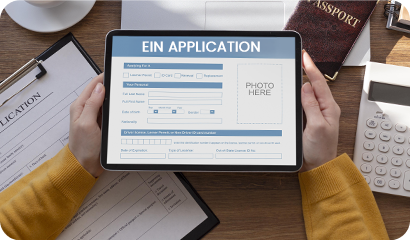Before you can apply for an EIN, you’ll need to choose the right business structure. Select your entity type below to get started with your EIN application.
Sole Proprietor / Individual
A sole proprietor is a business owned and operated by one person without a formal legal structure. As a small business owner, individual contractor, or freelancer you’re personally responsible for all debts and liabilities, meaning your business and personal finances are intertwined. An EIN application is needed for hiring employees or separating personal and business finances.
Limited Liability Company
An LLC is a flexible business structure that combines elements of a corporation and a sole proprietorship or partnership. It provides limited liability protection, meaning members are not personally responsible for business debts. LLCs can choose to be taxed as a sole proprietorship, partnership, or corporation. An EIN application is necessary for tax filing, hiring, and opening a bank account.
Trust
A trust is a legal arrangement in which a trustee manages assets on behalf of beneficiaries. Trusts are often used for estate planning, asset protection, or charitable purposes. There are different types of trusts, such as revocable and irrevocable trusts, each with unique tax implications. Obtaining an EIN is essential for a trust to file taxes, manage income, and comply with IRS regulations.
Estate of Deceased Individual
An estate is the collection of assets, money, debts, and property left behind by a person who has passed away. When an individual dies, their estate may need an EIN to handle financial matters, such as paying taxes, distributing assets, or managing trusts. As the estate’s executor or administrator, you need to complete an EIN application to facilitate legal and tax obligations.
Non-Profit / Entities
A nonprofit organization operates for a charitable, religious, educational, or public service purpose rather than a profit motive. Examples include charities, religious groups, and foundations. Nonprofits must apply for tax-exempt status with the IRS, but an EIN application is required first. The EIN allows nonprofits to open bank accounts, apply for grants, and file necessary tax documents.
Partnership
A partnership is a business structure where two or more individuals or entities share ownership. Partnerships can be general partnerships (GP), where all partners share liability, or limited partnerships (LP), where some partners have limited liability. An EIN application is mandatory for partnerships, as they must file tax returns separately from their owners and may need to hire employees.
C-Corporation
A C-Corporation (C-Corp) is a legal business entity separate from its owners. It provides limited liability protection, meaning shareholders are not personally responsible for business debts. C-Corps are subject to double taxation, where the corporation pays taxes on profits, and shareholders pay taxes on dividends. An EIN application is required to file taxes, hire employees, and conduct business legally.
S-Corporation
An S-corporation (S-Corp) is a special type of corporation that allows income, deductions, and credits to pass through to shareholders, avoiding double taxation. Unlike a C-Corp, an S-Corp does not pay corporate taxes. Instead, shareholders report income on their personal tax returns. To qualify, an S-Corp must meet specific IRS requirements. An EIN application is needed for tax and payroll purposes.
Personal Service Corporation
A Personal Service Corporation (PSC) is a type of C-Corporation primarily engaged in providing services in fields like law, accounting, healthcare, engineering, or consulting. The IRS imposes strict tax rules on PSCs, taxing them at a flat corporate tax rate. If your business qualifies as a PSC, you’ll need to complete an EIN application to file taxes and remain compliant with legal requirements.
Church Controlled Organization
A church-controlled organization includes religious groups, charities, and institutions affiliated with churches. These organizations are usually tax-exempt under IRS rules but are still required to complete an EIN application to conduct financial transactions, hire employees, and comply with tax laws. Even if a church itself doesn’t need an EIN, related organizations or ministries often do.

 See the Guide
See the Guide
























